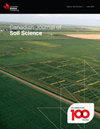In situ passivation effect of fertilizer passivation solutions with various pH on Pb-F contaminated soil
IF 1.5
4区 农林科学
Q4 SOIL SCIENCE
引用次数: 0
Abstract
Abstract The Maoniuping rare earth mine in Mianning, Liangshan Prefecture, is the largest rare earth deposit in China and the second largest rare earth deposit in the world. During the mining of rare earths, F and Pb, both types of heavy metal waste can directly or indirectly enter the soil, causing local soil contamination, which in turn poses a threat to the health of local residents. In this study, soil samples were incubated with fertilizer passivation solutions with pH values of 4, 5, 6, 7, 8, and 9, with the soil water content adjusted to 50% of the maximum water holding capacity in the field. The Pb-F contamination of the soil samples was analyzed to determine the existing states of the soil F and Pb and to study the remediation effect of fertilizer passivation solutions on the Pb-F contaminated soil. The results showed that under different passivation conditions, the pH, Pb, and F of the soil substantially changed and the passivation effect was enhanced over time. The pH of the soil significantly increased. The analysis of the effects of F and Pb treatment revealed that when the passivation fertilizer solution of pH 5 was used, the available Pb and F in the soil decreased the most, and the residual state of Pb and F increased to 77.86% and 57.24%, respectively.不同pH的肥料钝化液对铅氟污染土壤的原位钝化效果
摘要:凉山州绵宁市毛牛坪稀土矿是中国最大的稀土矿床,也是世界第二大稀土矿床。在稀土、F和Pb的开采过程中,这两类重金属废弃物都可以直接或间接进入土壤,造成当地土壤污染,进而对当地居民的健康构成威胁。在本研究中,土壤样品与pH值为4、5、6、7、8、9的肥料钝化液孵育,土壤含水量调整为田间最大持水量的50%。分析土壤样品的Pb-F污染情况,确定土壤F和Pb的存在状态,研究肥料钝化液对Pb-F污染土壤的修复效果。结果表明:在不同的钝化条件下,土壤的pH、Pb和F发生了较大的变化,钝化效果随着时间的推移而增强。土壤pH值显著升高。F和Pb处理效果分析表明,施用pH为5的钝化肥料溶液时,土壤中有效Pb和F减少最多,Pb和F的残留状态分别增加到77.86%和57.24%。
本文章由计算机程序翻译,如有差异,请以英文原文为准。
求助全文
约1分钟内获得全文
求助全文
来源期刊

Canadian Journal of Soil Science
农林科学-土壤科学
CiteScore
2.90
自引率
11.80%
发文量
73
审稿时长
6.0 months
期刊介绍:
The Canadian Journal of Soil Science is an international peer-reviewed journal published in cooperation with the Canadian Society of Soil Science. The journal publishes original research on the use, management, structure and development of soils and draws from the disciplines of soil science, agrometeorology, ecology, agricultural engineering, environmental science, hydrology, forestry, geology, geography and climatology. Research is published in a number of topic sections including: agrometeorology; ecology, biological processes and plant interactions; composition and chemical processes; physical processes and interfaces; genesis, landscape processes and relationships; contamination and environmental stewardship; and management for agricultural, forestry and urban uses.
 求助内容:
求助内容: 应助结果提醒方式:
应助结果提醒方式:


